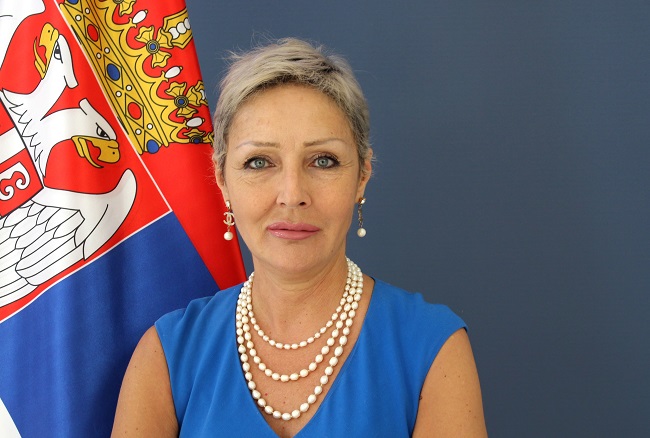H.E. JELENA MILIĆ
Ambassador Extraordinary and Plenipotentiary of the Republic of Serbia to the Republic of Croatia

CURRICULUM VITAE
Jelena Milić started her professional career in 1996, when she worked at the UNHCR office in Belgrade on cases of Serbian refugees from Croatia and Bosnia and Herzegovina, and their resettlement to third countries.
In the period from April 1997 to February 1999 she worked on the Helsinki Committee for Human Rights in Serbia project ”I want to go home”, concerning the return of Serbian refugees to Croatia. During her tenure with the project, the first large group of refugees was returned in an organized manner to Knin and the surrounding villages, and the first court cases were initiated before the Croatian courts for the restitution of property.
At the beginning of 2001, on a proposal of a distinguished Serbian diplomat Živorad Kovačević, she joined the Forum for International Relations of the European Movement in Serbia. During this period, together with Mr. Kovacević and journalist Dušan Simić, she launched and edited the monthly magazine of the Forum.
From 2001 until 2003, she was engaged as a researcher at the Belgrade Office of the International Crisis Group (ICG). During this period, the ICG published reports on the importance of cooperation with the International Criminal Tribunal for the former Yugoslavia.
Between 2004 and the end of 2007, she was a senior assistant to Goran Svilanović, president of the first Working Table (Democratization and Human Rights) in the Regional Cooperation Council of the Stability Pact for South East Europe, and the last Minister of Foreign Affairs of the Federal Republic of Yugoslavia.
At the end of 2007, with a group of like-minded people, she founded an independent, liberal, analytical organization, the Center for Euro-Atlantic Studies (CEAS) (www.ceas-serbia.org), which she headed from its establishment until the summer of 2021.
Under her leadership, CEAS focused on: analysis of Serbian foreign and security policy; monitoring the developments in the member states of the transatlantic world, NATO, and the EU; promotion of full and active membership of the Republic of Serbia in the EU and NATO; advocacy of the importance of the link between security system reform and transitional justice in post-conflict societies; methods of overcoming democratic deficits of multiculturalism.
During that period, CEAS published a series of highly regarded and cited reports, with Ms Milić as the lead author. Some of the better-known reports are: ”West Side Story - CEAS proposal for the correction of the administrative line between Serbia and Kosovo, agreed in a format under the auspices of West” (2018); "Basic Instinct: The Case for More NATO in the Western Balkans” (2017); “Eyes Wide Shut - Strengthening of the Russian Soft Power in Serbia - goals, instruments, and effects” (2016).
CEAS also organized and carried out a series of high-level international conferences, among which the the ”Belgrade NATO week” is perhaps the best known. It was held for nine consecutive years, growing from a small, educational event into a unique policy platform for discussion of Euro-Atlantic policies and integration processes.
All this made CEAS one of the most respected and influential analytical organizations in the Balkans with a wide media, institutional and social influence. CEAS has been cited by prominent liberal media such as The New York Times, Washington Post, Politico, etc.
In December 2016, the prestigious magazine Politico ranked Jelena Milić among the 28 most influential figures who will "shake, shape and stir Europe in 2017."
She is an alumna of the International Academy for Leadership of the German Friedrich Naumann Stiftung (IAF). She was an intern at the renowned Paris Research Center CERI of the Paris university Science Po.
Her articles have been published in prominent magazines such as The National Interest and The Diplomat and on web sites of analytical institutions such as the Center for European Policy Analysis.
Her longer essays were published by the NATO Defense College Foundation in Rome, the Paul H. Nice Center for Transatlantic Relations of the School of Advanced International Studies, The Johns Hopkins University in Washington, D.C., and the German Friedrich Naumann Foundation for freedom.
In the late nineties, she actively supported the work of the non-violent resistance movement OTPOR (Resistance), which significantly contributed to the fall of Slobodan Milosevic. She was a regional producer of the film on OTPOR ”Bringing Down a Dictator”, part of the A Force More Powerful series, a PBS project supported by the American Institute for Peace and the Albert Einstein Institution.
Jelena Milić was born on 15 January 1965, in Belgrade. She graduated and mastered at UNION-Nikola Tesla University in Belgrade. She speaks English, and has two grown children.